The Round Table transmitted a special presentation by compañero Rogelio Polanco Fuentes, a member of the Secretariat of the Central Committee of the Communist Party of Cuba, as part of the public complaint made by the First Secretary of the Party at the closing of the Second Plenary Session of the Central Committee on the plans of the US government and its political operators in Cuba to try to overthrow the Revolution.
At the beginning of his statement, he recalled the words of the First Secretary of the Party in the conclusions of the II Plenary of the PCC:
“Now they appear with a supposed peaceful march. It is nothing more than an escalation in the way of acting against the Revolution and a challenge to the authorities and to the socialist rule of law endorsed in our Constitution; (…) It is a provocation as part of a “soft blow” strategy. Its purposes coincide with the main lines of attack, slander, lies and threats used by those financed by the United States Government who oppose the Cuban political system and try to destabilize it and restore capitalism.
“We are not going to legitimize the imperialist actions in internal politics or give way to the desire for neocolonial restoration that some have accumulated and that are reinforced in crisis situations. It is not an act of civility, it is an act of subordination to the Yankee hegemony ”.
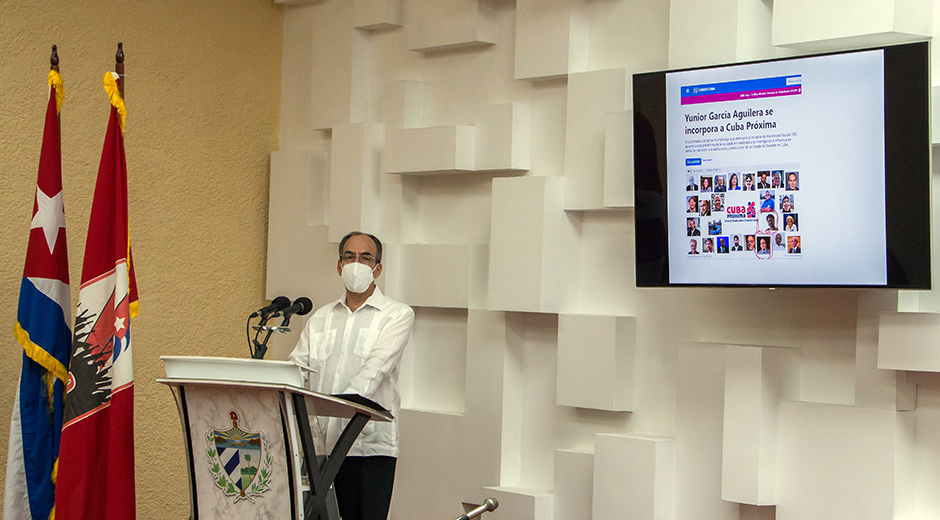
Special remarks by Rogelio Polanco Fuentes, Member of the Secretariat of the Central Committee of the Party. Photo: Abel Padrón Padilla / Cubadebate.
The Head of the Ideological Department of the Central Committee recalled that between September 20 and 27, a small group of citizens delivered similar texts to the headquarters of the municipal or provincial governments of eight provinces of the country announcing the decision to hold a supposedly peaceful march. .
“He underlined ‘the decision to hold a march’ because it was not a request: the holding of this march was being taken for granted. The action was conceived with a national scope in evident coordination by its promoters ”, he emphasized.
Later it was referred to as on October 12, the authorities of the municipalities where the aforementioned documents were delivered , gave a personal response to the senders. “On that occasion, the precise arguments were offered on the illegal nature of the march according to articles 56, 45 and 4 of the Constitution.”
“Among the reasons expressed, it was clearly established that the public projections of the promoters and their links with subversive organizations or agencies financed by the United States government have the manifest intention of promoting a change in the political system in Cuba, so that the the announced march constitutes a provocation as part of the regime change strategy tested by the United States in other countries,” he said.
Polanco Fuentes drew attention to how as soon as the march was announced, it received public support from US legislators, political operators and the media that encourage actions against the Cuban people, try to destabilize the country and urge military intervention. “It is something recurrent and permanent as these media and political operators from the United States urge military intervention in our country,” he said.
The Member of the Secretariat of the Central Committee of the Communist Party of Cuba said that from the beginning it was evident that it was a destabilizing plan orchestrated from abroad through internal political operators with violent intentions.
“Faced with the challenge of the promoters of the provocation in their attempt to ignore the refusal of the authorities, on October 21 the Office of the Attorney General of the Republic at its headquarters in several provinces began a process of warning these citizens; stating that if they did not comply with the authorities’ decision, they would incur the crimes of disobedience, illegal demonstrations, instigation to commit a crime, and others provided for and sanctioned in current criminal legislation ”.
In this sense, he explained that the action of the Prosecutor’s Office was based on article 156 of the Magna Carta, which establishes that “it is the State organ whose fundamental mission is to exercise control of the criminal investigation and the exercise of criminal action. on behalf of the State, as well as ensuring strict compliance with the Constitution, laws and other legal provisions by State bodies, entities and citizens ”; as well as Law 83 of 1997 “Law of the Attorney General of the Republic” in its article 7.
A new chapter in the Unconventional War against Cuba
It is evident that we are facing a new chapter of the unconventional war, the soft coup or the manual of non-violent struggle that the United States has carried out during contemporary times in several countries, Polanco Fuentes pointed out.
“Yugoslavia, Libya, Syria, Ukraine, Nicaragua, Venezuela are some of the examples where these unconventional war actions have been carried out. There is sufficient doctrinal information on how the United States has carried out these actions “
As explained, circular TC-1801, one of the main documents of the United States Special Forces, urges taking advantage of the possible vulnerability of the government to overthrow, distance itself from the population, displace the portion of the citizenry that acts in a neutral manner to positions against them, to exploit these elements through subversion and when this does not lead to the desired strategic results, resort to armed conflict, through the promotion of the insurgency.
“For that they use all the elements of the model, the economic and psychological point of view, actions of subversion, as well as the massive use of information and communication technologies with the aim of overthrowing those governments with a lower economic cost, political and military ”.
In his speech he referred to his personal experience in Venezuela, a country where he served as a diplomatic official. In this sense, he recalled that in 2013, 2014 and 2017 the so-called guarimbas were developed. These were violent actions by representatives of opposition sectors in Venezuela to overthrow the Bolivarian government that caused innumerable economic and human damage to society.
“There is a report from the Venezuelan state ‘The truth of Venezuela against infamy: data and testimonies of a country under siege’ published in September 2020 that has elements that are related to the actions that are intended to be carried out in our country. This report states that the total number of deaths during the violent protests in February 2014 was 43 people, while in the protests from April to July 20174 the Public Ministry registered 121 deaths and 1958 injured, however, in relation to the protests of 2014 the then secretary of states of the United States John Kerry issued a statement in which he affirmed that “the demonstrations were peaceful and accused the Venezuelan government of confronting peaceful protesters by force,” he said.
“A detailed examination, says the report, of the events that occurred reveals that most of the demonstrations provoked and promoted by opposition leaders between April and July 2017 were carried out in violation of current national and international legislation. These demonstrations led to actions of extreme violence characterized by the use of firearms, Molotov cocktails, mortars and homemade weapons, the placement of barricades, death traps on public roads, damage to institutions, schools, health centers, and siege against military and police facilities. There were three unprecedented practices in the recent history of the country: setting fire to people designated as supporters of the government, using children and adolescents to prepare firebombs,guarding barricades and attacking the security forces, as well as the combination of high levels of violence with religious and patriotic symbols ”.
The official also highlighted how the report itself acknowledged with concern the fact that the media intended to present these events as peaceful demonstrations. “Some here are beginning to look for so-called non-violent methods of struggle to obtain advice and carry out some of these actions in Cuba.”
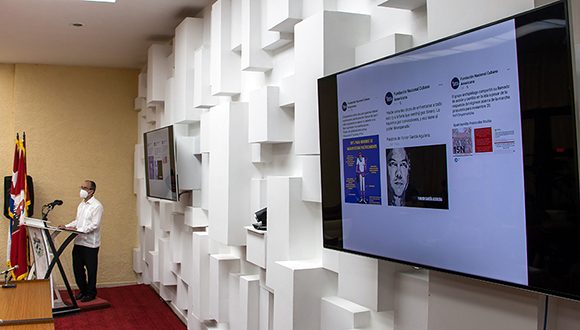
Special remarks by Rogelio Polanco Fuentes, Member of the Secretariat of the Central Committee of the Party. Photo: Abel Padrón Padilla / Cubadebate.
Abundant funding for subversion
Regarding financing for subversive actions in other countries, he warned that it has been a systematic practice of the governments of the United States, which is why a network of institutions with multimillion-dollar funds has been created.
He emphasized that among the emblematic institutions are the NED and USAID. Polanco recalled that the first was born in 1983 within the so-called Democracy Project to openly do what the CIA had been developing for decades in a covert manner. “The objectives of the NED have always been political subversion and the so-called regime change from a network of organizations that promote courses, events, awards, scholarships, the foundation of NGOs, think tanks, foundations and university centers.”
In his presentation, he explained that among those organizations born in Latin America is CADAL (Center for Democratic Aperture in Latin America) , which is part of a wide network of non-governmental organizations that the United States uses to finance and channel financing. for its political operators through the NED and USAID.
“There are many public references to the financing of the NED to CADAL as part of the tentacles for the framework against progressive processes in Latin America and other parts of the world. The NED awarded CADAL $ 107,000 in 2017 and $ 100,000 in 2021 for the project called “A regional approach to promote democratic values in Cuba.”
The links between the United States and its political operators in Cuba
He revealed that two Cuban citizens are part of the generous beneficiaries of the funds of these US organizations: Manuel Cuesta Morúa and Yunior García Aguilera, signatories of the documents delivered to the Cuban authorities regarding the intention to carry out marches in various cities of the country.
Both, he explained, traveled to Argentina in 2018 to participate in an event of this CADAL organization coordinated by the project “Times of change and the new role of the Armed Forces in Cuba.”
Among the objectives of this course, Polanco pointed out, were to give continuity to the FAR stadium to transmit possible scenarios and supposed future allies to activists, cooperate with Cuban actors in order to link with members and former members of the FAR open to change processes. “The subversive, conspiratorial and coup intentions of these projects are clear. You have to be delusional to make a dent in the dignity of our undefeated Revolutionary Armed Forces ”, he prevailed.
The Cuban politician denounced that both CADAL and its director Gabriel Salvia have been very active in supporting the provocations for next month in Cuba.
“In 2019 Cuesta Morúa and García Aguilera continued their preparation in a workshop sponsored by the Universidad San Luis Campus Madrid. There they received lessons from Richard Youngs, an expert on public protests as a method of political change ”.
As Richard Youngs points out, riots are increasingly a major route through which ordinary people seek to achieve social, political and economic transformation. “Protesters must make tough decisions, do they just disengage from politics or build new kinds of civic campaigns? Do they join existing political parties or do they move away from mainstream politics altogether?
The Member of the Secretariat of the Central Committee of the Communist Party of Cuba listed that among the new types of civic campaign are the so-called political prisoners, violence, the formation of organizations, as well as the creation of conditions to carry out new demonstrations and the proclamation of new dates for these mobilizations. Actions are also promoted to evade police control and prevent police forces from preserving peace in the country.
He added that the Cuba Money Project website revealed that the United States Agency for International Development (USAID) awarded at the end of September about $6,669,000 dollars for subversive projects in Cuba, out of a total of $18,000,000 that it can allocate until 2023. for these purposes.
“Among the main beneficiaries are the Cuban Democratic Directorate, led by Orlando Gutiérrez Boronat, which has received $617,500, as well as the media created for the media campaign against Cuba, including ADN Digital with $2,031,260 and Cubanet $783,000. There are more than 70 million dollars that were dedicated during the Trump administration for subversion, to which should be added the more than 100 million the broadcasting office for Cuba of the misnamed Radio and Television Marti ”.
These organizations, he said, have served as financing for politicians and mercenaries living under the generous spill in Washington. He also recalled that these organizations continue to receive support and funding from the United States authorities, the State Department, the National Security Council and the Embassy in Havana, as denounced by the first secretary of the Central Committee of the Communist Party. of Cuba in the recent plenary session of the party organization.
The United States is the organizer of the provocation
“The United States government is the true organizer and promoter of the provocation mounted for November, the facts and statements prove it. They have not taken care to hide it. Senior government officials participate directly in its conduct ”, he stated.
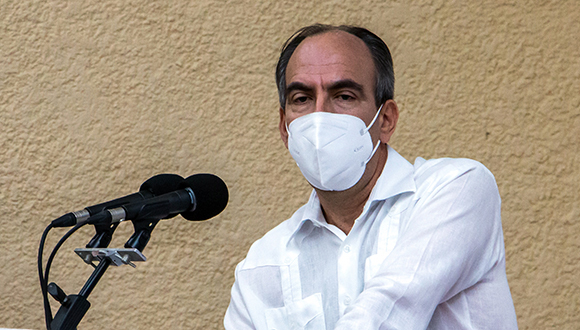
Special remarks by Rogelio Polanco Fuentes, Member of the Secretariat of the Central Committee of the Party. Photo: Abel Padrón Padilla / Cubadebate.
Similarly, he added that recently the US government threatened new measures against Cuba, if the local operators of its anti-Cuban strategy are not allowed to act with impunity in the country, as stated in an interview by Juan González, director for Western Hemisphere affairs of the National Security Council. He pointed out that his administration will act if Cuba processes the organizers of the march “Cuba does not accept threats, nor is it intimidated. Our history of resistance and dignity confirm this ”.
“Save your threats as our people say. Nor are we surprised by the support for this alleged march by violent organizations and notorious terrorists of the anti-Cuban mafia and the hate-generating media center in Miami. We have all witnessed that since it was announced by its organizers, the march received the public and notorious support of US legislators, political operators and the media that encourage actions against the Revolution, ”he highlighted.
The enthusiastic support of Miami’s anti-Cuban mafia
Polanco stated that tweets, statements, resistance assemblies and other frenzied actions that have occurred these days in Miami, as if the actions were to take place in that city. “Regime change, government overthrow and military intervention” are once again the prevailing narrative in South Florida. Among the most fervent have been some of the congressmen, already known, as active promoters of the blockade and its subversion against Cuba and defenders of the violent riots of July 11.
Among the first to speak is the reconverted terrorist Orlando Gutiérrez Boronat, who has declared that this action will serve to overthrow the regime. This is the head of the so-called Cuban Democratic Directorate, leader of the self-styled Assembly of the Resistance. On December 4, 2020, after the events of November 27, he advocated an armed intervention in Cuba to overthrow the government. After July 11, he has repeatedly called for military intervention in the country.
The USAID and the State Department have awarded the organization at least $6,970,979 from 2006 to 2019, public records show. This character coincides in some platforms for the capitalist restoration in Cuba that have a certain academic profile with one of the promoters of the supposedly peaceful march
Another of the march’s enthusiasts is the Cuban-American National Foundation, the spearhead of anti-Cuban policies since the 1980s. Besides being the organizer of numerous terrorist acts against Cuba and several attempted attacks against Commander-in-Chief Fidel Castro Ruz. In 2019, this foundation received $1,385,637 dollars of US taxpayer money to “empower Cuban civil society to build a lasting democracy in Cuba that is free from human rights violations, by improving awareness, the effectiveness of civil society on the island, in non-violent activism and facilitating training materials, communication equipment and technical knowledge ”. These days on its Facebook page, the foundation is giving guidance – he pointed out – on how to go and what to do in the supposedly peaceful and independent march.
One of the promoters of the violent provocation, Polanco indicated, is the Cuban citizen Saily González Velázquez who recently recognized the support of the Cuban-American National Foundation through its human rights director, Omar López Montenegro.
The alleged marchers also have the encouragement of the mercenary network of Brigade 2506, whose president on duty declared in Miami that “with these steps, an explosion will be promoted within Cuba, so that new us brothers take to the streets and this lead us to the collapse of the regime ”. These are the external political operators who call for overthrowing the Revolution, violence and chaos.

Special remarks by Rogelio Polanco Fuentes, Member of the Secretariat of the Central Committee of the Party. Photo: Abel Padrón Padilla / Cubadebate.
The head of the Ideological department in the Central Committee of the Communist Party of Cuba warned that another of those who is applied among the promoters of the provocation is the terrorist Ramón Saúl Sánchez, whose violent record is such that he has not even been able to receive official asylum in the States United, although he has never stopped having the protection of its authorities.
“He has been linked to a dozen terrorist organizations since he was 16 years old, including the Organization for the Liberation of Cuba, Omega 7, Coordination of United Revolutionary Organizations (CORU), Alpha 66, National Front for the Liberation of Cuba, Youth of the Star and the Democracy Movement. With Alpha 66 he participated in more than 20 terrorist acts, mainly against ships and diplomatic missions ”, denounced Polanco Fuentes.
It also indicated that Ramón Saúl Sánchez was the second head of CORU, an organization that carried out more than 90 terrorist attacks against Cuban facilities in various countries, including within the United States. The most notorious was the bombing of the Cubana de Aviación plane over Barbados, where 73 people died.
Documents dated between 1979 -1982 link this terrorist to the attack on the Cuban Interests Section in Washington and the repeated assassination attempts on the then Cuban ambassador. “The so-called Democracy Movement has been a promoter of flotillas that have violated Cuban territorial waters on several occasions,” Rogelio Polanco revealed.
Provocation is doomed to fail
“The provocation of November 15 is doomed to failure, it was never authentic. Its attempt to cover itself with some legality is a perverse manipulation. The Constitution of the Republic is a genuine creation of the people, there is no plot that it can hide. The promoters of the alleged march follow the Yankee script, carry out their orders, surround themselves with violent men and terrorists and dream of carrying out their destabilizing actions with impunity,” he said.
With our first party secretary and president of the Republic of Cuba we proclaim that “there are enough revolutionaries here to confront with intelligence, with respect and in defense of our constitution; but also with energy and courage any manifestation that tries to destroy the Revolution ”.
On November 15, he said, Cuba will open its doors to the world and will also open schools to children, that explosion of joy, happiness and hugs so far contained by the hard months of the pandemic. That is the joy that the promoters of hatred intend to frustrate, “but they will not be able to prevent Cuban mothers from enjoying that sublime moment of accompanying their children to the classrooms, nor the tender smiles of the teachers with the return of their longed-for students. They will not be able to prevent Cuba’s triumph in the face of the pandemic thanks to their own vaccines created with the ingenuity of scientists trained in Revolution. Vaccines made possible by the visionary thought and action of Fidel, founder of a genuinely Cuban biopharmaceutical industry ”.
“They will not be able to prevent the transition towards a new normality, a responsible normality that will allow us to gradually open up our economic and social life in the coming weeks. They will not be able to prevent the feat of Cuba, of its health professionals, of its workers, of its youth, of an entire people that in creative resistance advances optimistically over colossal adversities. They will not be able to prevent Cuba’s victory in the face of subversion and the criminal blockade of the United States, intensified in the midst of the pandemic, which magnifies our glorious epic ”, he pointed out.
Like our National Hero José Martí, whom some seek to outrage with their neo-annexationist pretensions, we proclaim “… What should true lovers of the country do…? We are here to prevent the enemy from cornering the standard-bearer, or the flag falling into the wrong hands:… Here we are vigilance and love, cordiality and sentinel, passion, reasoned by judgment, of everything that bears the name of decorum. Cuban”.
These are our reasons, the reasons of Cuba!
[No English subtitles in this 45 minute video.]
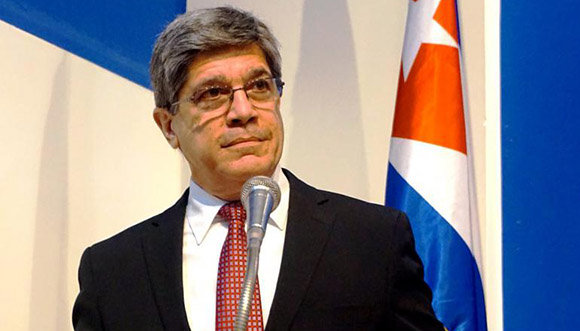

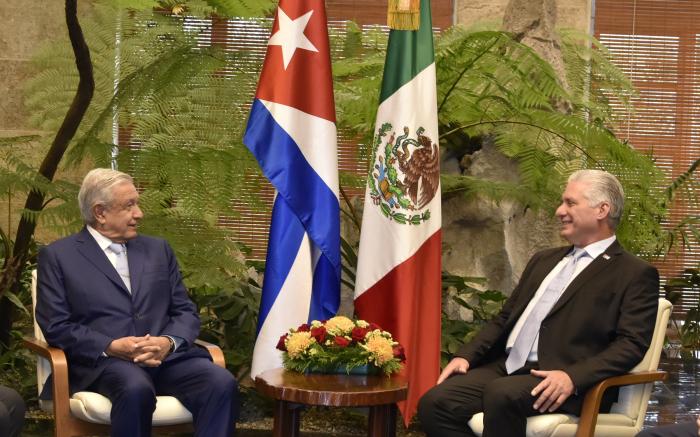

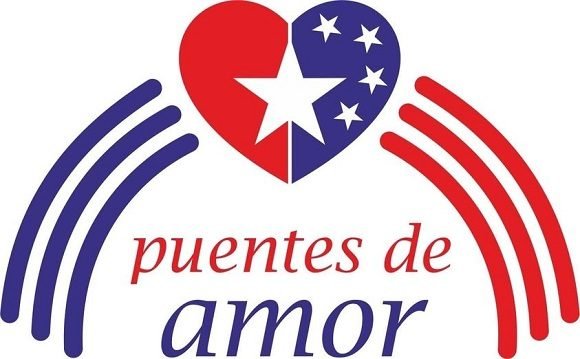
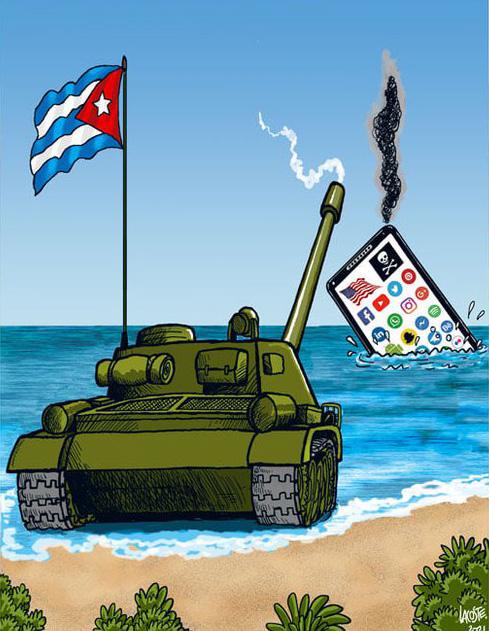

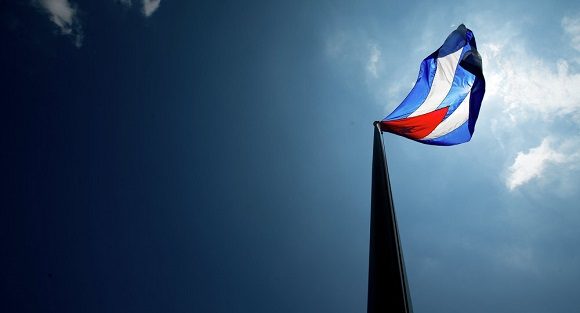
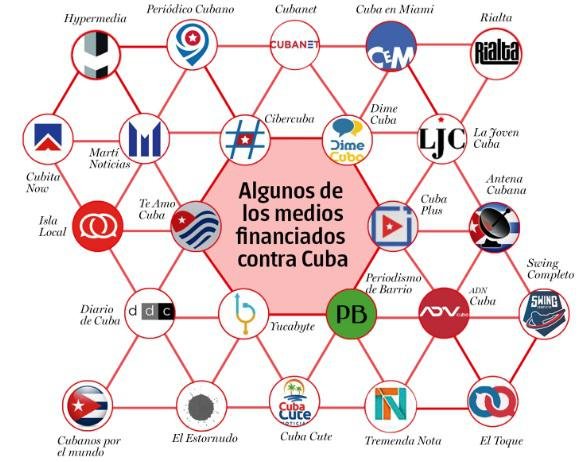
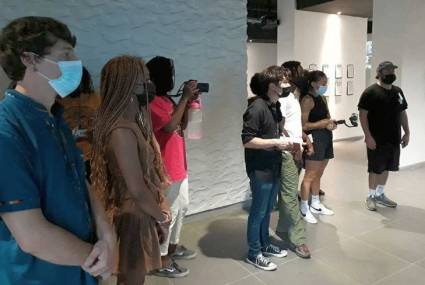


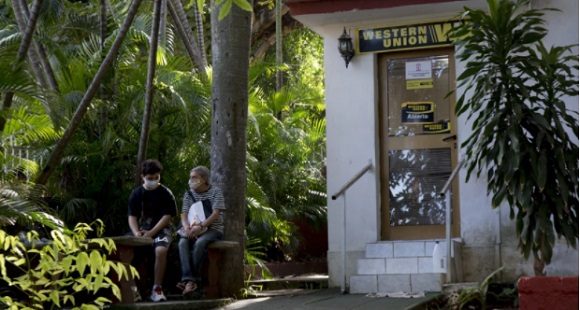


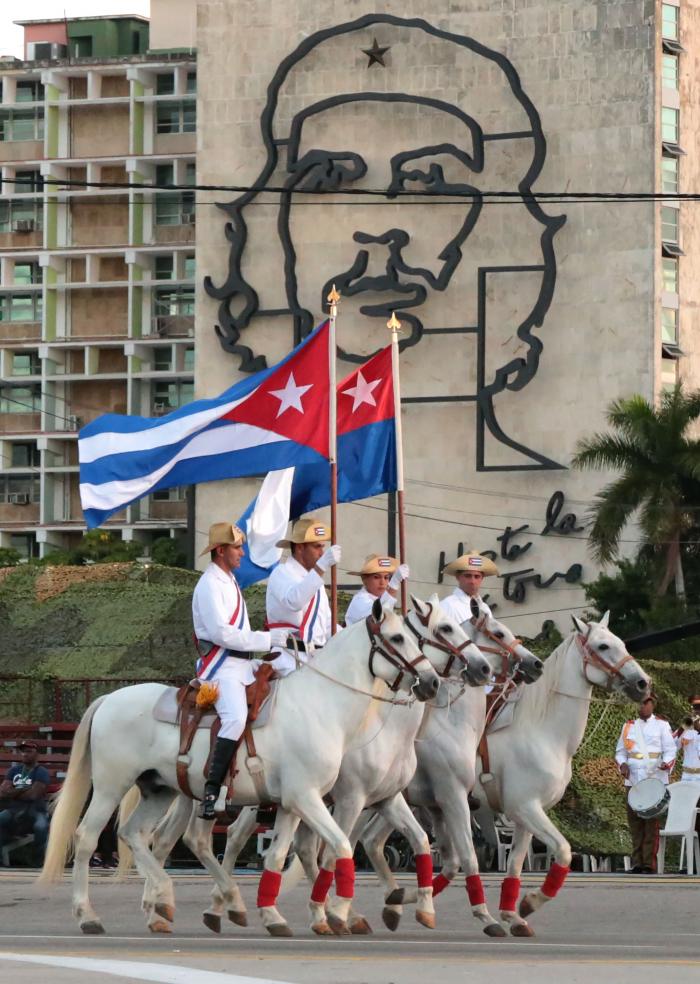
You must be logged in to post a comment.